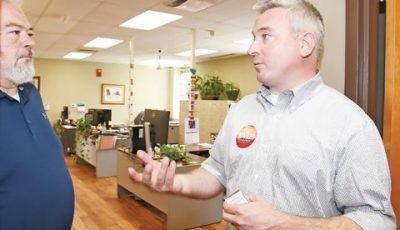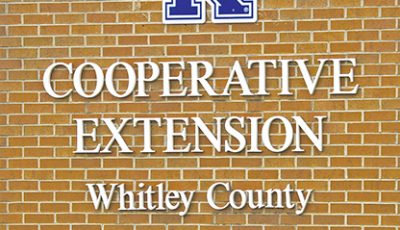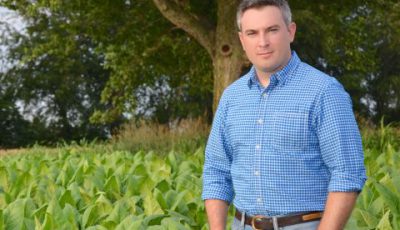Ky. Agriculture Commissioner visits Whitley County
Alternative crops, misconceptions about agriculture and the local food movement were among the topics that Kentucky Agriculture Commissioner Ryan Quarles addressed during two stops in Whitley County Thursday.

Ryan Quarles, Kentucky Commissioner of Agriculture, talks with The Wrigley Taproom and Eatery co-owner Kristen Smith, left, about farm-to-table produce used at the restaurant.
Quarles spoke to a group of more than three-dozen people – many of who are farmers – at the Whitley County Extension Office Thursday afternoon.
Quarles noted that there are a lot of changes taking place in agriculture on both the state, federal and international level.
“It is important from us at the Department of Agriculture to get feedback from those who are actually out working the land and being stewards of the soil,” Quarles said.
He noted that there are a lot of positives concerning Kentucky agriculture right now.
For instance, this past year was one of the best production years in a decade.
“I just wish the price was a little better,” Quarles said.
He noted that Kentucky has one of the best livestock genetic programs in the country.
“Kentucky has a reputation of having some of the best cattle in the nation. We are hoping to process that here into our grocery stores,” Quarles said. “Half of all chicken eaten in the world can be traced back to Kentucky.”
Kentucky also has a thriving farmer’s market program with farmer’s markets in 116 counties across the state.
Still Kentucky has challenges.
“If you were to ask me what the biggest challenge at the state level is for agriculture right now, it is inconsistent farm income,” he said.
“We came off some really good cattle prices a few years ago. They have come back down but they have stabilized some. We used to have very high dollar corn in 2013 and 2014, but they have come down. This fluctuation in farm income is hard on farmers. It is hard for us to plan the next year when we don’t know what is going to come into our coffers.”

Quarles took a few minutes after his address at the extension office to pose for a photo with members of the Whitley County High School FFA Club.
Another challenge is trying to educate people and policy makers about the basics of agriculture.
“A few months ago, the Washington Post’s front page story revealed the results of a national survey that showed 16 million Americans legitimately think that chocolate milk comes from brown cows, and white milk comes from white cows. These are grown adults,” Quarles told the audience that was made up largely of local farmers.
“The same survey shows that 40 percent of our school children don’t know that cheese is a dairy product. They don’t know that hamburger isn’t ham. It is actually a beef product.”
Alternative crops
About 20 years ago, Kentucky was forced to start exploring alternative crops.
Kentucky is exploring industrial hemp, but it is also looking at other alternatives crops, such as knaffe, which is a fibrous plant with no legal issues that is being used in biofuels and manufacturing.
“There is a big push for fuel efficiency right now. How do you increase your fuel efficiency? You decrease the weight. They are looking for lightweight natural fibers. Hemp and knaffe, we have already sent Kentucky grown fibers to Tesla in California for them to experiment with for automotive parts right now,” Quarles said.
Hops, which is a major ingredient in beer, is also being explored as an alternative crop and used to be a major crop grown in Kentucky before prohibition.
Quarles got a $50,000 grant from Washington, D.C., to help explore this.
Kentucky currently has about 15 commercial hops growers in the state, some of who are making between $10,000 and $20,000 per acre.
In 1980, there were 50 craft breweries in the United States and now there are 6,000.
“This could be a crop for small acreage farmers that could be a shot in the arm,” Quarles added.
Local food movement
“The local food movement is real,” said Quarles noting that he ate lunch at The Wrigley Taproom and Eatery in Corbin prior to visiting Williamsburg.
Quarles said that roughly eight percent of all corn grown in Kentucky is used to make bourbon. He noted The Wrigley’s prodigious collection of bourbons it serves to patrons.
As Agriculture Commissioner, he’s instituted the Kentucky Hunger Initiative in order to battle hunger in the state. One in six Kentuckians are malnourished and 1 in 5 school children go hungry each day.
“I’m blessed to represent an industry that has an abundance of food,” Quarles said. “We are the safest, most abundant food supply in the world and we can do a better job of helping those less fortunate.”
He also talked about a program where blemished or otherwise unmarketable food is purchased at a reduced cost from farmers to help feed the hungry.
Kristen Smith, part owner of The Wrigley, thanked Quarles and everyone in attendance during his visit for “believing in our local economy and local agriculture.”








